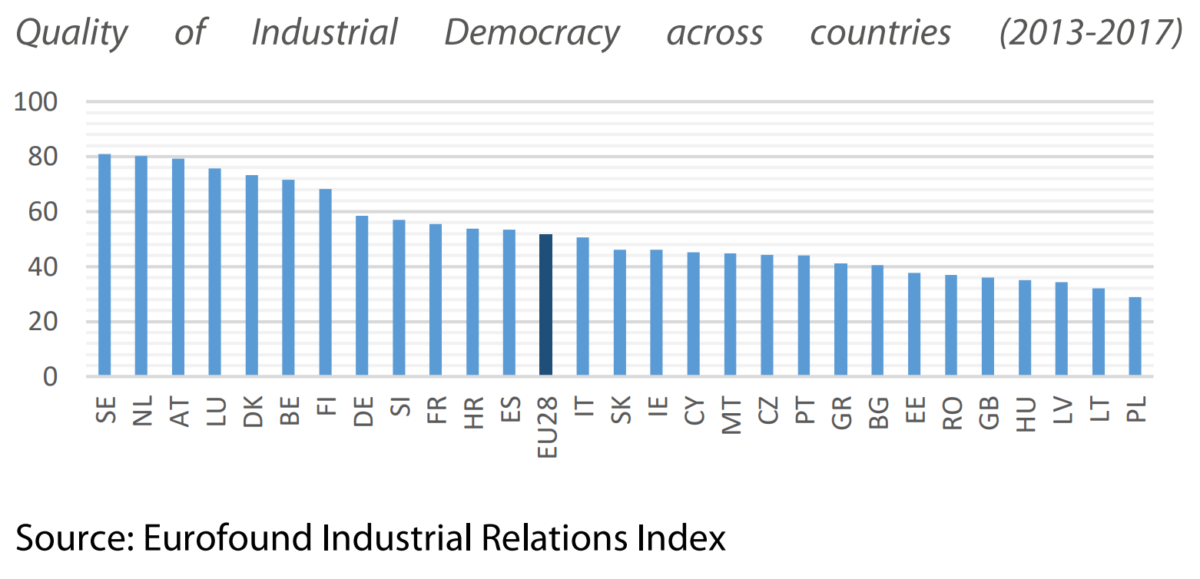We all are experiencing the effects of technology on the job market and in our workplaces. Whether you work remotely, find jobs or “gigs” through digital labour platforms, work alongside machines, or simply use digital tools to do your job— the digital transition affects you. At the same time, we are progressing towards a climate-neutral economy; i.e. the green transition, replacing “brown” jobs with “green” ones. A huge disruption is underway for people working in carbon-intensive industries or even those living in regions with high dependence on fossil fuels. How do we shape this twin (digital and green) transition for the benefit of society? How do we ensure the benefits and costs of new and green technologies are distributed fairly? We tried to answer these questions (and more) in our latest study on Unionisation and the twin transition: Good practices in collective action and employee involvement.
Digitalisation and greening are reshaping the world of work.
To begin with, we tried to summarise the impacts of both digital and green transitions on labour markets and workplaces. The overarching conclusion is… it depends! We emphasise that the twin transition can have both positive and negative impacts on workers, and there is no single predetermined transformation path. Rather, the transitions’ effect depends greatly on how technologies are introduced.
Take digitalisation: technology can take over some of the most boring, dangerous, or physically strenuous tasks and allow workers to focus on more complex, non-repetitive, and “fun” activities. This can lead to an efficacious cycle of high-level tasks, continuous upskilling (to be able to perform them better), worker autonomy, and increasing productivity and wages. But not all tech trends lead that way– a look at platform workers suffices to see a workforce that is falling into a “trap” of low-skilled service jobs (e.g., delivery riders or clickworkers), managed by algorithms they don’t understand, working under extreme conditions of precarity and insecurity, and with little prospects of career progress. It is up to policymakers, social partners, and us to steer the digital transition in the right direction.
While digitalisation is largely a market-driven trend (although shaped by policy), greening comes from a deeper sense of “climate emergency” and is a much more policy-induced process. Its effects are also much narrower: while digitalisation impacts (to varying degrees) pretty much all of us, the green transition is disproportionately disrupting a handful of sectors and regions— and it’s disrupting them big time. In this case, the big question for policymakers is how to balance the urgency of moving to a carbon-neutral economy and the need to address the sudden loss of jobs in “dying” industries triggered by this “shock therapy”.
Overall, the distribution of gains and costs is a crucial factor in managing transitions. While highly skilled and mobile workers can reap the benefits of the ongoing changes more easily, workers with insufficient skills and/or in collapsing industries face increasingly precarious working conditions, dismissals, or risk exclusion from the labour market altogether, creating a divide which fosters labour market polarisation and increasing inequalities.
How can social partners lead a just transition?
The key contribution of our study is to point out possible ways forward for the EU policymakers and social partners to shape the transitions in a sustainable manner. In this context, workers’ voices are beneficial in shaping the transitions in a sustainable and inclusive manner. However, social partners engage in policy-making related to the twin transition only to a limited degree. They face significant challenges, such as unsupportive institutional frameworks and no legal obligations (including at the EU level) to involve social dialogue in shaping transition plans. Similarly, social partners have insufficient internal capacity (including access to funding and know-how) to adequately engage in debates on the future of work. Broader challenges, such as declining trade union membership (partly due to the shift from historically highly unionised industrial sectors to service sectors with a weaker culture of collective action), don’t help either.
As emphasised in interviews with EU-level social partners, the macro-level conditions that allow workers and worker representatives to be heard vary significantly across the EU Member States. The stark differences between countries’ industrial relations systems can significantly alter the ways in which transitions are managed, although there are notable exceptions. Likewise, case studies of practices for involving employees in technology adoption have been identified across countries from both the highest performers in the Eurofound’s Industrial Relations Index and the lowest scorers alike.
Nevertheless, good practices of collective action exist across the EU at all levels. Social partners draw collective agreements at the EU and national levels to address the key challenges (see the European Social Partners Framework Agreement on Digitalisation). They co-create transition plans to guarantee workers in affected industries aren’t left behind (for example, a pact between social partners and the Spanish government provided €250 million to be invested in mining communities, including retraining and early retirement, as the country’s coal mines shut down). They organise capacity-building activities and platforms for good practice exchange (e.g., EPSU’s toolkit for trade unions Responding to the challenges of digitalisation). Finally, they provide tools to facilitate changes at the workplace level (for instance, the German union IG Metall designed Compass for digitalisation to help workers and work councils evaluate and shape digitalisation in workers’ interests).
Besides the macro level, we also investigated good practices for employee involvement in technology adoption at the company level. The results of our case studies suggest that, where employees are involved, technology adoption leads to generally positive outcomes for the workers, including a shift to more complex and interesting tasks, upskilling, improved working conditions, or better work-life balance. However, companies engage employees in the transitions to different extents. Their involvement can often be reactive— e.g., adapting the technology to their work processes, undergoing training, or participating in employer-led consultations. Only in cases with established multi-level frameworks (including supportive policy, engaged trade unions, and strong co-determination action at the company level), could employees play a more meaningful role in the transformation.
What’s next for EU transition policies?
Based on our investigation, we develop several recommendations for the European Parliament’s Committee on Employment and Social Affairs on how to facilitate better social dialogue for a just transition. Among other points:
- We advocated a better alignment of EU industrial and employment policies and the inclusion of social goals in sectoral policies. For example, the current proposal for the Artificial Intelligence Act almost completely ignores the impact of AI on employment relations (including algorithmic management of workers).
- We suggested embedding legal mechanisms at the EU level to push the Member States to improve institutional conditions for social dialogue. In the twin transition context, this could include, for example, the obligation to involve social partners in setting strategic priorities related to restructuring (e.g. within the Just Transition Mechanism).
- We recommended providing more direct project funding and support to trade unions, including for research, training, and expertise building, to keep their expertise up-to-date and help navigate the topics requiring high-level technical knowledge.
To find out more, you can check out the full study, or read the at-a-glance summary. If you still have questions, drop us a line!



